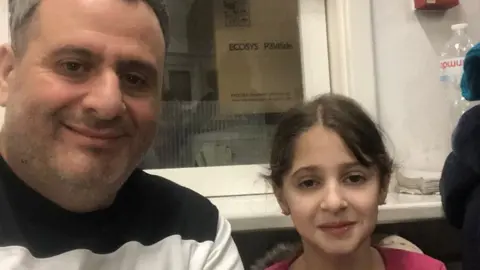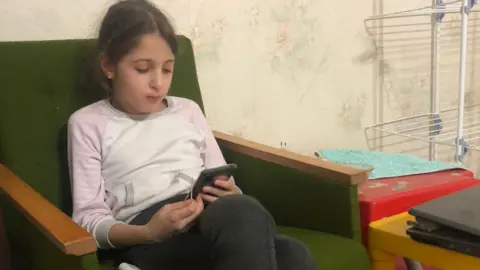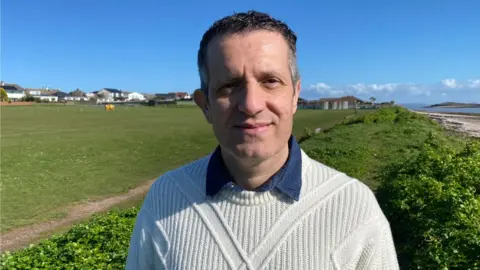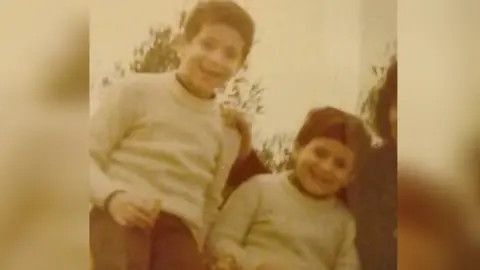Ukraine: Doctor's struggle to get escaping family to Wales
 Ayham Mohaffel
Ayham MohaffelA doctor has said he has to "fight the system" to try and bring his brother and niece to Wales after fleeing their home in Ukraine.
Dr Ghadir Mohaffel's brother Ayham and niece Dana, nine, are now refugees in Hungary.
Mr Mohaffel is from Syria and moved to Kyiv in 2016. He is not a Ukrainian citizen and has a Russian passport.
The UK government says it is making it "quicker and simpler" for Ukrainians to come here.
Its website states both the Ukraine family reunion scheme and the sponsorship programme are for Ukrainian nationals.
A spokesman added that anyone not eligible for the schemes should claim asylum in the first safe country they reach.
Dr Mohaffel, a GP in Sully, Vale of Glamorgan, said his and Ayham's main concern was to give Dana a "normal life" again.
Ayham and Dana left their Kyiv flat after nearby explosions and drove for three days to reach the Hungarian border.
Dr Mohaffel said Ayham could not go back to Syria because of the war there and has never lived in Russia, despite having a Russian passport from a previous marriage.
He said Dana became "really upset" and "overwhelmed" in Hungary and she and her father were confined to one room for 24 hours with about 30 other people while checks were done.
Their stay in Hungary is limited and Ayham's nationality appears to make a move to the UK difficult.
 Ayham Mohaffel
Ayham Mohaffel"That's the big problem," said Dr Mohaffel.
"With him not being a Ukrainian citizen he can't apply for the Ukrainian family scheme that the Home Office proposed on 4 March, I think, because that only applies to Ukrainians.
"So at the moment he can't use this and it is a similar situation in Europe as well.
"All European countries are giving access to refugees and residency in Europe based on being a Ukrainian citizen.

"So we're trying to get through the Home Office on exceptional cases saying that even though he is not a Ukrainian citizen he doesn't have anywhere else to go to."
Dr Mohaffel's MP, Stephen Doughty, said he is "continuing to press the Home Office" to give the family clear guidance on the options available to them.
"As we have discovered in numerous cases from Afghanistan and Ukraine there are individuals and families who do not fit neatly into the criteria the online forms establish," he said.
"It is important they receive assistance and advice and are not left to fall through the gaps, of course recognising appropriate checks will always need to be carried out."

War in Ukraine: More coverage

Dr Mohaffel said he understood that when dealing with "hundreds of thousands of people" a "blanket approach" was needed, but added this did not always work.
"There are always exceptions and that's what makes it hard for these people because they have to start fighting the system and find ways of going through which are not always that easy."
He said Dana's welfare was their primary concern.
"She was in school up to the day before the invasion happened so she has been again uprooted completely.
"She needs to live somewhere where she can have a normal life, she can go to school, she can have friends, because at the moment everything is so unclear."
 Ghadir Mohaffel
Ghadir MohaffelThis is the second time their family has been affected by war.
The two brothers left Aleppo before the Syrian conflict began in 2010 but their mother has lived in Aleppo throughout and Dr Mohaffel said she "went through hell".
He added: "She had literally rocket launchers next to her building. She could see the balcony and they were just firing at the rebels back and forth.
"So she really, really suffered a lot and it was heart-breaking to see and not be able to help.
"I think what happened with the Syrian war it damaged all of us really because you feel very heartbroken.
"And I think in his [Ayham's] case to go through that again now I think has changed him as a person a little bit and made him quite sad."
- Wales Live, BBC One Wales at 22:30 GMT on 16 March
